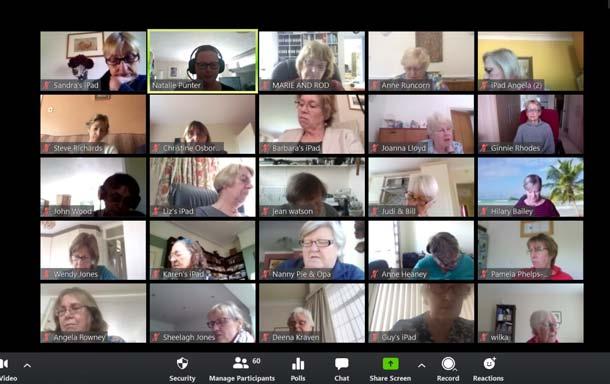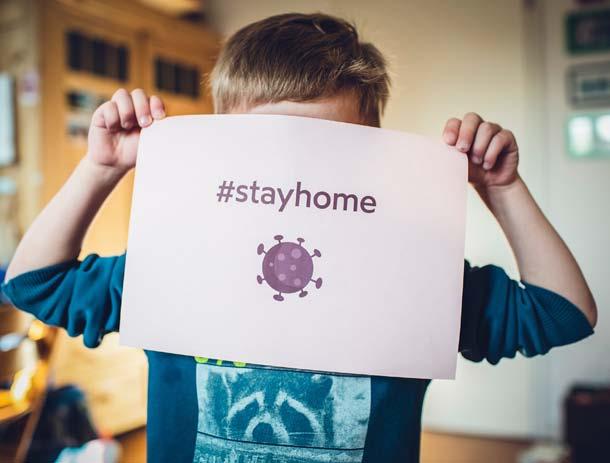
7 minute read
FEATURES
Women’s lives in lockdown
While women everywhere are facing new challenges in these troubling times, NWR members are lucky to have a ready-made support network, writes Judith Charlton.
Advertisement
As NWR members celebrated Diamond Day on 26 February, coronavirus was unlikely to have been uppermost in their thoughts. There were just 13 recorded cases in the UK, none of them home grown, and the first recorded British death two days later took place in Japan, onboard the Diamond Princess cruise ship. Yes, cases were surging in the far east and there was lockdown in Lombardy, but we still couldn’t quite imagine it happening to us.
But by the time the World Health Organisation confirmed the virus to be a pandemic, on 11 March, we were left in little doubt. Supermarket shelves were being stripped bare, theatres and cinemas emptying and sporting fixtures and festivals being cancelled. The lockdown announcement on 23 March was to some extent a relief: at least we knew where we stood.
What now for NWR? Well, 60 years’ experience of women supporting women would not go to waste. Across the country people were scrambling to form networks to support their neighbours: we had one ready-made. Formed in the days of snail mail and landlines, now we also had technology on our side.
One of NWR’s strengths is that, as well as being a national organisation, it is also a collection of small autonomous groups which can rapidly change and adapt in whatever way best suits their members. Soon many groups were mastering video communication software such as Zoom, and continuing to meet virtually. Others use email to stay connected, or Whatsapp, while, for those who prefer traditional methods, several telephone trees have been established.
Topics for meetings range from astronomy to limerick writing to bucket lists for 2021, and members are mindful of the need to look for the positive aspects rather than the limitations of
NWR members around the country enjoy a virtual quiz night their new situation, by sharing photos of beautiful garden flowers, or anecdotes about their daily walks. At least one group has declared their meetings a COVID-free zone, in the same way that talk of children and housework was discouraged in the early days. Book groups continue – we have plenty of time to read – and members exchange tips about online exercise classes, where to buy seedlings and soil, which restaurants are offering takeaway food, and numerous other services that might make isolation more bearable.
Staff and trustees were also well placed to adapt to the restrictions of lockdown: being spread out around the country, they are used to working and meeting remotely. Soon a
Clothing historian Lucy Adlington giving an online talk for NWR members on the history of knitting
programme of virtual events was being rolled out, including a subscription to an online theatre offering, and online quizzes and speakers, which have been much appreciated.
However, it is probably fair to say that, in some ways, NWR members have less to lose from the coronavirus crisis than many women. Our age profile means that the majority of us are not having to reinvent ourselves as home educators at the same time as endeavouring to hold down a job – indeed, retirement means that, for many, loss of employment and income is not a fear.
So, what of women in the wider world? Although we have learnt that women are less likely than men to die from the virus, there are other ways in which they are disproportionately affected.
To start with, women are more likely than men to do jobs that put them on the front line of the battle against COVID-19: World Health Organisation figures show that, globally, 70% of workers in the health and social sector are women. In Europe, 84% of nurses are female.
In addition, women are much more likely to be unpaid care givers: according to the International Labour Organisation

A virus called Covid-19 Is all around though quite unseen Our lives have changed We are all deranged But our houses are sparkly clean
Photo by hello-i-m-nik on Unsplash

they perform 76.2% of the total hours of unpaid care work worldwide. In some countries this will also put them at greater risk of infection as health systems become overburdened and relatives have to be cared for at home.
And the structure of the workplace is such that this imbalance is likely to be exacerbated as working couples are now faced with decisions about who will look after the children while schools and nurseries are closed. In the UK, government figures show that 40% of employed women work part-time, as opposed to just 13% of employed men, and that the gender pay gap for all employees stands at just over 17%. Thus, for many heterosexual couples, economic priorities will dictate that it is the woman’s job that is the more expendable.
For single parents, the situation is even more difficult. There is no partner with whom to share the juggling act of earning and caring, and other sources of support, such as grandparents, may be out of bounds due to social distancing measures. In the UK, there are around 1.8 million single parents, making up nearly a quarter of families with dependent children, and around 90% of them are women.
Research also indicates, perhaps surprisingly, that more women than men work in jobs that cannot be done from home. In the UK, according to the Institute for Fiscal Studies (IFS), women are around one third more likely to work in a sector that has been adversely affected by the pandemic, such as retail, hospitality or travel.
It is too soon to know for how long some women’s economic and career prospects may be disadvantaged by these changes, but we do know from studies of the Ebola outbreaks in West Africa that, while income fell for everyone, income for men returned to its previous level faster than for women.
These studies also found that maternal and reproductive health suffered as resources were diverted to the emergency response. Between 2013 and 2016 in Sierra Leone, one of the countries worst affected by Ebola, more women died of obstetric complications than from the disease itself. Access to contraception is another service likely to suffer and, again in Sierra Leone, school closures were held to be partly to blame for a rise in teenage pregnancies during the outbreak. In countries where women have less decision-making power than men, their needs are less likely to be met during an epidemic.
Early reports from the UK appear to bear out some of these theories. On 27 May, the IFS released a report on how parents have been balancing work and family during lockdown which
Ladies in isolation Are full of consternation What to do? No paper in the loo And no chance of a summer vacation
found, amongst other things:
Mothers are one-and-a-half times more likely than fathers to have either lost their job or quit since the lockdown began.
They are also more likely to have been furloughed.
Mothers combine paid work with other activities – almost always childcare – in 47% of their work hours, compared with 30% of fathers’ work hours.
In families where the father has stopped working, the parents share childcare and housework equally, but the mother also does five hours of paid work a day. But there is reason to believe that some good may emerge too. With employers being forced into embracing work from home schemes and teleconferencing, there is the hope that a more flexible business culture will result, with all the advantages this could bring to women who wish to combine career with family. And for a small but significant number of couples, that difficult decision about whose job is the most expendable will have led to a reversal of traditional gender roles which may well persist after the crisis is over. Limericks courtesy of Morpeth NWR Sources: The Atlantic https://bit.ly/3eOygJA BBC Future https://bbc.in/3eUEbN3 Center for Global Development https://bit.ly/3782PHw Institute for Fiscal Studies https://bit.ly/2Ugxqxn The Lancet https://bit.ly/2MC7xnA World Economic Forum https://bit.ly/2XDcjHH
Send us your lockdown experiences for the Autumn issue: how have you coped, what have you missed, what have you enjoyed? The deadline is 31 August 2020 and the email address to use is office@nwr.org.uk

Photo by Markus Spiske on Unsplash





